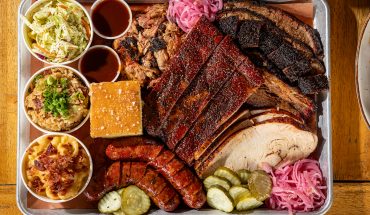Bavarian roots and N.C. ingredients combine in these fine German pastries
by Joel Haas | photography by Bob Karp

The solid-granite façade of Annelore’s German Bakery in Cary promises Old World craft. Its logo exudes tradition, too: a shield for wordly protection, an angel for spiritual guidance and a boulder for stability and longevity.
Inside is a Konditorei, a Bavarian-style pastry and coffee house. Breads and sweets, all made daily by hand, fill the display cases, while tempting aromas waft from the 2,200 square-foot commercial kitchen. Here, hearty, wholesome breads are made with distinctly German ingredients. One example: the Brötchen, a roll with a crunchy crust and soft center, is a mainstay for sandwiches in Austria. My mother tried making these in the States after our family lived there for a few years in the 1960s, but the taste was never the same without the special flour. These are the real deal—I ate five in two hours.

A sweet love story
German natives Norbert and Annelore Gstattenbauer are both descendants of gastronomes: Annelore Gstattenbauer’s family owns a brewery that dates to the 1600s (that’s where the logo came from), as well as a restaurant and a bed and breakfast near Ulm in southern Germany; In Munich, Norbert Gstattenbauer’s mother never allowed pre-packaged food on her table.
According to Norbert Gstattenbauer, it only took one (well, maybe two or three) apple fritters to win his heart. He’d gone over to his classmate’s apartment to study, and this classmate happened to be Annelore Gstattenbauer’s older brother. She was busy cooking. “It was proven again: the way to a man’s heart is through his stomach,” grins Norbert Gstattenbauer, and the two were soon a couple. They moved to New York for work 35 years ago, where they lived for 22 years.

Finding their niche
When friends started raving about the lifestyle in the Triangle—Southern friendliness, warmer winters and a lower cost of living—the couple came down to see for themselves. They fell in love with the area, but there was the practical matter of making a living. Annelore Gstattenbauer, who had worked as a private chef, wondered what she could make and sell here. She figured sweets are always a hit, and she was terrific at making pastries. They started their business with a four-foot long table at the State Farmers Market twelve years ago. Annelore Gstattenbauer baked at home until the wee hours of the morning, then Norbert Gstattenbauer would man the table at the Farmers Market.
At first, business was slow. The breakthrough came almost by chance in 2009, when Annelore Gstattenbauer made something savory: authentic Bavarian pretzels. The couple announced the new product with a little sign. Suddenly, the crowds of passers-by realized that not only were the pretzels German, but so were the rest of the items, treats many had never seen or heard of. “Incredibly, we had not thought to label what made Annelore’s pastries different,” says Norbert Gstattenbauer. “Having long since become American citizens, we thought labeling our wares as foreign would turn customers away!”

Authentic baking
Slowly but surely, business grew. Germans in the Triangle started asking Annelore to make Christmas Stollen, traditional German bread and cakes. The couple was working 12-hour days, seven days a week. They engaged other pastry chefs, but soon it became clear that what they really needed was a commercial kitchen. When a run-down spot in downtown Cary went on the market, they snapped up the ideal location, tore down the building and reopened their new place in 2017. All the equipment is German or Swiss, as are many of the pastry chefs they’ve hired. (One advantage to all-European equipment: it’s set to metric measurements, like Annelore Gstattenbauer’s recipes.) Customers can see Annelore Gstattenbauer work in the kitchen as they stand at the cash register. “This is a prime example of theater baking,” says Norbett Gstattenbauer. “We’re showing the customer actual in-house production.”
One popular cake is the PrinzregentenTorte (“Prince Regent’s Cake”), which Annelore Gstattenbauer says isn’t made anywhere else in the Triangle. It was created over 135 years ago by the King of Bavaria’s royal baker on the day of his coronation: Seven layers of very thin, individually baked sponge cakes to represent the seven districts of Bavaria, with chocolate buttercream in between. The whole cake is topped with apricot jam, enrobed with semi-sweet chocolate ganache and dotted with a single fleck
of edible 24-carat gold leaf for each slice.
Another signature confection, the ‘bee sting’ cake, dates back to the Middle Ages. Legend holds that residents in a besieged city threw beehives over the walls to drive away an attacking army. To honor the bees, a thick layer of sponge cake is topped with an even thicker layer of buttercream, on top of which another layer of sponge cake is added. Slivered almonds and honey are slathered on the top before baking. “The bee sting cake is so popular we make it daily,” says Annelore Gstattenbauer.
While the Gstattenbauers source flour and other specialty ingredients from Germany, they use local honey, fruit and nuts when seasonably available. They met many of their sources through that first table at the Farmer’s Market. “By knowing the producer, we can trust the purity and quality of the product,” says Norbert Gstattenbauer.
As we finished our interview, I asked Annelore Gstattenbauer what she likes to eat when she goes home. “After a day of sweets, I like spicy and salty food,” she laughed. Then she went back to making stacks of German-bred fritters with fresh N.C. apples.



